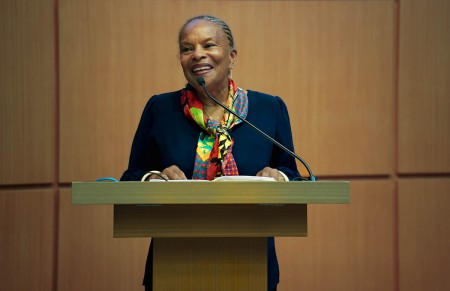

According to the French-Guinean poet, writer, and economist, the forest should not be treated as an empty space (photo: Daniel Antônio/ Agência FAPESP).
With COP30 in Belém approaching, the ideas of the former French Minister of Justice are gaining momentum, inviting us to rethink multilateralism and the structure of the institutions that shape the world.
With COP30 in Belém approaching, the ideas of the former French Minister of Justice are gaining momentum, inviting us to rethink multilateralism and the structure of the institutions that shape the world.

According to the French-Guinean poet, writer, and economist, the forest should not be treated as an empty space (photo: Daniel Antônio/ Agência FAPESP).
By Maria Fernanda Ziegler | Agência FAPESP – In a world marked by growing tensions and the weakening of multilateral institutions, such as the United Nations (UN), Christiane Taubira, an economist and former French Minister of Justice, proposes a social justice-focused approach to thinking about the Amazon.
With COP30 approaching in Belém, in the Brazilian Amazon, the French-Guyanese economist's ideas are gaining momentum as an invitation to dialogue and reimagine the structures that shape the world, starting from the forest rather than viewing it from an outside perspective.
"The Amazon is plural. It's a large geographical entity fragmented into nine different national histories. The forest isn't just a natural landscape, but a space of life, culture, and history. There are lives in the Amazon, very modern cities that still preserve traditions," Taubira said during the 8th FAPESP Conference, held on October 20 with the theme "The Contemporary Amazon and the Challenges of Social Justice."
The economist criticized multilateral institutions for treating the forest as an empty space. "There's talk of protecting 'the lungs of the world,' yet the United Nations approaches the protection of the Amazon as if it were a desert, ignoring the fact that lives and ways of existence are rooted there," she added.
Taubira, who is from the Amazon region, highlighted a quote attributed to Nelson Mandela: "What you do for us without us, you do against us." She recalled one of her earliest struggles while she was still an activist in Cayenne, French Guiana. While participating in the Rio 92, she learned of the French government's intention to create a park covering 40% of French Guiana's territory.
"I fought so that it wouldn't be called a national park, as parks in France are called, where no one lives inside them. I was concerned with preservation while also respecting the ways of life of the people who lived in that environment," she said.
Years later, after becoming a member of parliament and settling in France, the park was established under the name Amazonian Park of French Guiana.
Taubira has had a remarkable political career – 19 years in the French parliament and five in the European parliament – and stood out for passing laws that recognized slavery as a crime against humanity, banned landmines, and held France accountable for its nuclear tests.
From 2012 to 2016, she served as Minister of Justice under François Hollande and spearheaded significant reforms, including the legalization of same-sex marriage and enhanced anti-corruption efforts.
This year, her connection with Brazil deepened when she accepted the 12th José Bonifácio Chair at the University of São Paulo (USP). In this role, she is developing the research project "Amazonian Societies: Plural Realities, a Common Destiny?" The project has given rise to the book Amazônias: Espaço Vivo, Social, Político, launched in October. Taubira coordinated the work, which was organized by Camila Perruso and Djamila Delannon. It features contributions from anthropologist Manuela Carneiro da Cunha; lawyer Pedro Dallari; former French Prime Minister Laurent Fabius; French-Tunisian historian Sophie Bessis; and indigenous anthropologist Almires Martins Machado.
The book will be presented at COP30 to contribute to the visibility of the region's peoples during the multilateral meeting.
Structures disconnected from reality
According to Taubira, global power structures seem to be disconnected from the current reality. "The multilateral governance we have today is a reflection of the post-World War II world: a club of approximately 60 countries in an imperialist landscape. Today's world, with its 195 nations, has rendered this architecture powerless and incapable of ensuring world order," she said.
The former congresswoman and poet defends poetry as a means of listening to everyone. "When political debate becomes harsh, it is poetry that allows us to understand others and achieve social justice. Poetry invites us to constantly reach out to others and recognize that they carry a little bit of us."
In an era of multilateral inconsistency, she also emphasizes the importance of language, "which is more than mere words; it's imagination, a way of describing the world."
The lecture "The Contemporary Amazon and the Challenges of Social Justice" can be viewed at https://youtu.be/fVwsTBQYH6U.
Republish
The Agency FAPESP licenses news via Creative Commons (CC-BY-NC-ND) so that they can be republished free of charge and in a simple way by other digital or printed vehicles. Agência FAPESP must be credited as the source of the content being republished and the name of the reporter (if any) must be attributed. Using the HMTL button below allows compliance with these rules, detailed in Digital Republishing Policy FAPESP.






